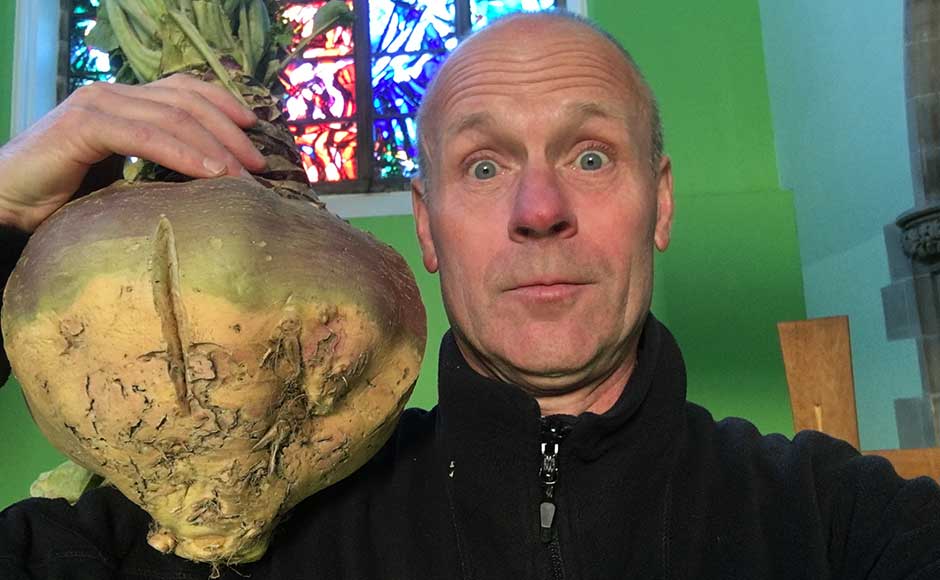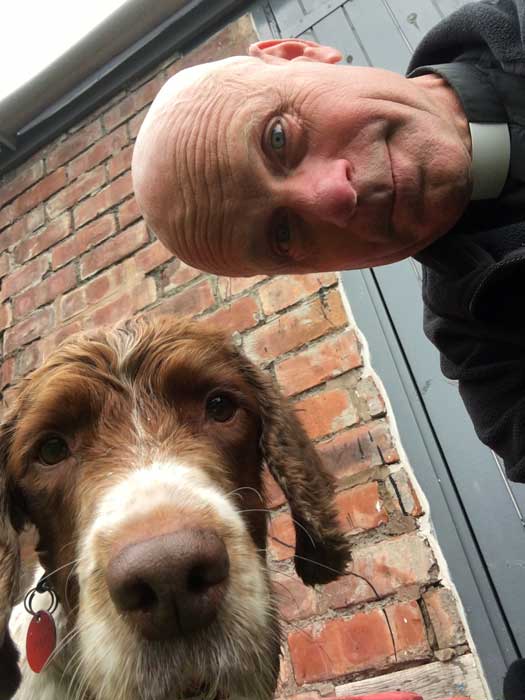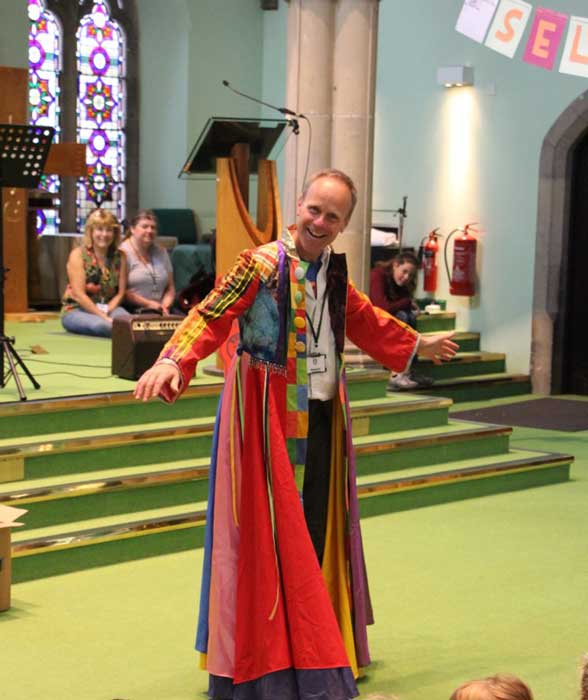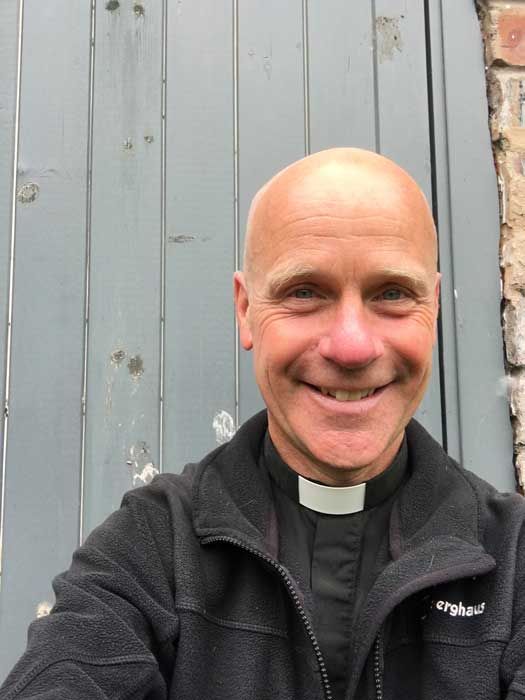May 2023: Shaped by Christian Community
Each month, the Church of Scotland's ‘Talking Ministry' series will share a personal story from those serving in Christian ministry, along with resources filled with questions, prayers and reflections to help encourage reflection on how God might be calling you at this time.

For May, Rev Stewart Weaver, who recently celebrated 20 years as minister of Portobello and Joppa Parish Church, talks about a faith journey which has brought him from the USA to the shores of the Firth of Forth.
My ministry: Rev Stewart Weaver, Minister of Portobello and Joppa Parish Church
What is your background?
I was born in the state of Wisconsin in the US and, after living for a few years in Detroit, Michigan and Kentucky, did much of my growing up outside Buffalo, New York.
My mother grew up in a Presbyterian Church in Virginia and, when her father died at a relatively young age, the local Presbyterian church was caring and supportive. She never forgot that. So, in the course of the many moves, the church — always a Presbyterian church — was a source of continuity and also a smaller community within a wider community that welcomed us and helped us settle into a new environment.
When did you start to experience a calling to service?
The youth group where I grew up was excellent. It was led by a dynamic associate minister who wanted to ensure that the church was engaged in the wider world.
There were therefore opportunities to help in the inner city and there were week-long work projects to areas of urban or rural need.

In the rebellious and/or questioning teenage years, there was a confirmation that there was a care and commitment to the Christian faith that asked for dedication and sacrifice. Moreover, there was the sense that we as teenagers were listened to and were taken seriously. Our thoughts were heard and we were treated like young adults. It was at this stage that a seed was sown.
Such seeds lay dormant until the end of my university days.
Others were going off to do lots of fairly conventional things (graduate school, working in banking or insurance or whatever) and none of this struck a chord. I thus volunteered through the Presbyterian Church USA (PCUSA) to work with the homeless in Portland, Oregon, for a year.
That led to two years teaching English in Qingdao in the People's Republic of China through the Amity Foundation. Here I was following in the footsteps of a great-great uncle who had worked as a doctor in northeast China in the early 1900's.
When I returned from China, I spent six months working with refugees in Buffalo through a Presbyterian supported programme.
While the practical support for the homeless was formative, as was the teaching and work with refugees, these highlighted that, if people in a community, society or world simply do not care for each other or love others, then all of the practical support will wither and education could be turned in any direction. Perhaps it was important to get to the heart of things… and thus a call became less of a niggle and more of a consideration.
The possibilities of ministry were seen with something like an open eye, for my mother, who had taught history prior to marriage, returned to university when my brother and I went to high school. First, she studied Hebrew and Old Testament, and then trained to be a minister in the PCUSA. There was thus encouragement to consider it as a calling.
What brought you to Scotland?
While in China I met a British woman who had also decided to teach for two years after university. We met at an Amity conference in Xiamen, China and ended up travelling with two other Amity teachers to Thailand.
One thing led to another and, after many 24-hour train journeys in China, eventually I landed in Bristol. We then travelled north to Edinburgh for me to study at New College, which seemed wise, given the connections between the PCUSA and the Church of Scotland.
What is your current role?

I am currently minister of Edinburgh: Portobello and Joppa Parish Church. Apart from the attempts to ensure a healthy church, which would be utterly impossible without so much support in Portobello and Joppa, my main responsibility currently revolves around Presbytery planning.
I began convening the deployment group of the Presbytery of Edinburgh and West Lothian in January of 2022 and the Presbytery have just agreed the draft plan.
The dedication of the team and the willingness of people in the congregations to engage in a difficult process has been humbling.
What have been the biggest challenges you have had to overcome in your ministry?
Initially, it was balancing family life and parish life.
When I began in Portobello, my three and five-year old boys were abounding in energy and my wife worked about 35 hours a week.
The congregation were wonderfully supportive and understanding, and appreciated the many demands on time and energy.

Hopefully, in turn, the insights gained from complete immersion in family and parish life helped the congregation to see things afresh.
After that, another challenge has been my involvement of a three-way union in Portobello. Listening to the many voices, trying to understand the articulated issues and the underlying issues and trying to reach a workable way forward certainly stretched things.
Again, however, the patience and grace of so many was inspiring, as was the support of Presbytery and the input of Hugh Donald from a Place for Hope. Presbytery planning has taken that and multiplied it exponentially!
But, in the midst of all of this, perhaps the biggest challenge has been the consistent shift and change in perspectives in order to engage people at the level of hearts, minds and souls. Listening to parents in a playground, hearing concerns at a church meeting, considering issues at a community level, contributing at a national and international level.
In the midst of it all, people seem to want to be heard, understood, valued and loved. That is called grace. In the midst of the hurly burly, so very difficult to do.
What lessons have you learned that you might pass on to someone new to ministry or considering a ministry role?
I was fortunate to facilitate groups of students for the Ministry Training Network for many years.
There always seemed to be an inherent paradox. On one level, ensure that there is time and space for moments with God, Christ and the Spirit. Without that, we wilt.
But, on another level, so often we need to get ourselves right out of the way: it's not about me, or my opinions, or my theology, or my preferences. It's about this person or these people right here, right now, who may just benefit from a word, touch or gesture that conveys, no matter how weakly or insufficiently, the love we've been blessed with through Christ. Not me, but thee.
May Discernment Resources: Shaped by Christian Community
The value of each ministry
When we begin to talk about and discuss the value of each person within the church and how the whole people of God contribute their individual parts to make up the whole, one of the most obvious bible passages that springs to mind is "one body, many parts" from 1 Corinthians 12. However, in a recent exploration session for those considering becoming elders, it was really fruitful to look at the passages on either side of this well-known and well-worn text.
Read this passage out loud, twice. Listen and hold onto in your mind or even write down on the second hearing which parts jump out and stick with you. How is God speaking to you about the part you play in the ministry of the whole people of God?
Gifts of the Holy Spirit
12 Brothers and sisters, I want you to know about the gifts of the Holy Spirit.
4 There are different kinds of gifts. But they are all given to believers by the same Spirit. 5 There are different ways to serve. But they all come from the same Lord. 6 There are different ways the Spirit works. But the same God is working in all these ways and in all people.
7 The Holy Spirit is given to each of us in a special way. That is for the good of all. 8 To some people the Spirit gives a message of wisdom. To others the same Spirit gives a message of knowledge. 9 To others the same Spirit gives faith. To others that one Spirit gives gifts of healing. 10 To others he gives the power to do miracles. To others he gives the ability to prophesy. To others he gives the ability to tell the spirits apart. To others he gives the ability to speak in different kinds of languages they had not known before. And to still others he gives the ability to explain what was said in those languages. 11 All the gifts are produced by one and the same Spirit. He gives gifts to each person, just as he decides.
1 Corinthians 12 v1, 4 - 11
Recognising our talents and gifts
As well as recognising that there are many different gifts and that you may have one in particular, some or a few or even none that are mentioned here or need a bit of interpreting and nurturing, you may have been incredibly struck by the simple fact that it is God who gives the gifts. God decides what gifts to give but you, you choose what to do with them. Like being given a house plant as a present, we may be filled with a sense of disappointment (because we would have liked something else!) or trepidation because it involves an implied responsibility if we are to value, cherish and nurture the gift. However, if we come to understand and appreciate the gift, it can grow and develop into something beautiful and full of life.
The location of the call to service
1 Corinthians then moves on to the well-known words about the body and its many parts and how they are in relation to each other; a metaphor so rich in evoking the nuances of human relationship and community dynamics. Our gifts only make sense when they are in the context of community. When we read "if the body were only an eye then how would it hear" this not only describes how we all need each other, it also points out that we only discover what we are and what we can do by recognising what we are not and what we do not do alongside others. This is where "one body, many parts" connects strongly with the body of Christ. We are called, each and everyone of us, to have respect and concern for every part of the body and to learn that when one part suffers all suffer, when one part is praised and valued, everyone feels that. This is why there is a shared ordination vow in the Church of Scotland for both elders and ministers: "do you promise to seek the unity and peace of the church?"
To contemplate/discuss
Do I see myself as other see me?
In my church, in my community, is God speaking through others to me?
How do we seek the unity and peace of the church in meetings and in phone calls, in every day arguments and in occasional big decisions?
How do we negotiate and navigate relationships with complex or difficult parts of the body that we would rather not mention or pay attention to?
What are the less "churchy" or less obvious spiritual gifts that are often the most essential in our times of upheaval, uncertainty and transition?
Here is the follow up passage to the "one body, many parts":
You are the body of Christ. Each one of you is a part of it.First, God has placed apostles in the church. Second, he has placed prophets in the church. Third, he has placed teachers in the church. Then he has given to the church miracles and gifts of healing. He also has given the gift of helping others and the gift of guiding the church. God also has given the gift of speaking in different kinds of languages. Is everyone an apostle? Is everyone a prophet? Is everyone a teacher? Do all work miracles?Do all have gifts of healing? Do all speak in languages they had not known before? Do all explain what is said in those languages? But above all, you should want the more important gifts.
Love Is Necessary
But now I will show you the best way of all.
1 Corinthians 13
The eldership affirmation "Do you believe the fundamental doctrines of the christian faith; Do you promise To see the unity and peace of the church; To uphold its doctrine, worship, government and discipline; And to take your due part in the administration of its affairs?"
Surely things apply to ministers too. What do they mean?
Every elder is expected to:
- Attend worship regularly
- Remember the work of the church in their own prayers
- Give sacrificially of their time talents and money
- Attend Kirk Session meetings and workgroups/ committees
- Work in partnership with the minister and the other elders
However, individual elders/ministers might use their gifts in:
- Leadership & vision building
- Pastoral care
- Developing forms of worship
- Administration
- Outreach
- Christian education
Do you know what each of these mean? Which ones do you think you could do? Which ones do you think you could not do?
A prayer for elders
Grant them the gift of your Holy Spirit, that their hearts may be set on fire with love for you and those committed to their care. Make them pure in heart as those who have the mind of christ. Give them vision to discern your purposes for the church and the world you love. Keep them faithful to the end in all their service, that when the chief shepherd appears, they may receive glory, a crown that never fades. Amen
Book of Common Order of the Church of Scotland, St Andrew Press 1994, pp.338-339
O wad some Power the giftie gie us To see oursels as ithers see us!
Robert Burns
More information
If you would like to consider how God might be calling you to serve at this time, you may want to discuss further with your minister or be in touch with your Presbytery to explore local opportunities.
If you are interested in exploring a call to the recognised ministries of the Church, you can find more information on our vocations page and can contact ministry@churchofscotland.org.uk for a Discernment Conversation with one of the Recruitment Team.